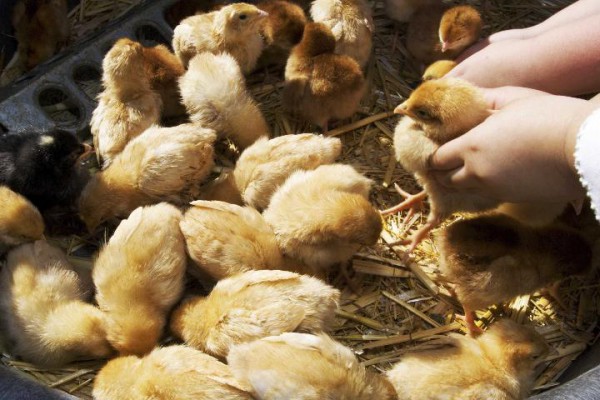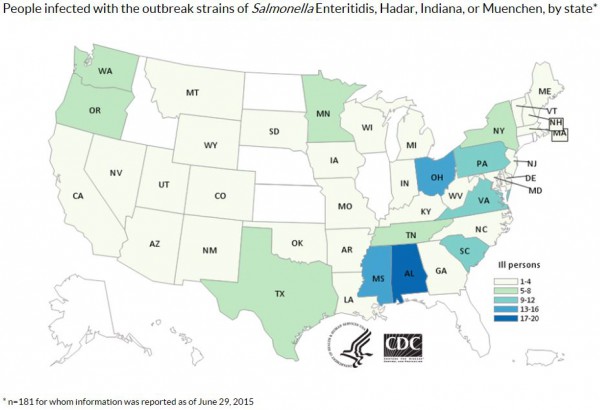
There is always a Salmonella infection risk associated with handling poultry. Avoid droppings and carefully wash hands after handling to greatly reduce the risk.
Photo Credit: iStockphoto
There are currently four multi-state outbreaks of human Salmonella infections associated with contacting live poultry being investigated by the United States Department of Agriculture – Animal and Plant Health Inspection Service (USDA-APHIS) and Centers for Disease Control and Prevention (CDC). As of July 1, 2015 a total of 181 people, in 40 different states, have been infected with the outbreak strains of Salmonella. These infections have resulted in 33 hospitalizations. At this time there are no reported infections in Florida. However, Alabama leads the nation with 17 cases and four additional cases have been reported in Georgia. With reported cases in both Alabama and Georgia, poultry producers in the Florida Panhandle need to take every precaution to protect themselves and prevent further spread of this disease. More detailed information regarding the outbreaks is available at the CDC website.

Number of outbreak strain Salmonella cases by state.
Source: http://www.cdc.gov/salmonella/live-poultry-07-15/map.html
Poultry can carry Salmonella and show no signs of illness. Salmonella germs are spread from poultry through their droppings. The droppings or anything that has been in contact with droppings (the birds’ feet, legs, feathers, cages, etc.) can have Salmonella germs present. When humans come into contact with a contaminated surface they can pick up the germs. In order for Salmonella to make people sick it must enter the body, usually through the mouth. Careful, thorough, hand washing is key to protecting yourself from Salmonella if you are in contact with live poultry or facilities where poultry have been kept. Below are additional recommendations form the CDC.
From the CDC – Advice to Backyard Flock Owners
Contact with live poultry and their environment can make people sick with Salmonella infections. Live poultry can be carrying Salmonella bacteria but appear healthy and clean and show no signs of illness. Follow these simple tips for protecting yourself and others while enjoying backyard poultry:
- Wash your hands thoroughly with soap and water right after touching live poultry or anything in the area where they live and roam. Adults should supervise hand washing for young children.
- If soap and water are not readily available, use hand sanitizer until you are able to wash your hands thoroughly with soap and water.
- Do not let live poultry inside the house, in bathrooms, or especially in areas where food or drink is prepared, served, or stored, such as kitchens, or outdoor patios.
- Children younger than 5 years, adults older than 65, and people with weakened immune systems should not handle or touch chicks, ducklings, or other live poultry. People in these groups are more likely to have a severe illness from Salmonella infection.
- Do not snuggle or kiss the birds, touch your mouth, or eat or drink around live poultry.
- Stay outdoors when cleaning any equipment or materials used to raise or care for live poultry, such as cages or feed or water containers.
- These recommendations(http://www.cdc.gov/Features/SalmonellaBabyBirds/) are important and apply to all live poultry regardless of the age of the birds or where they were purchased
Additional resources relating to potential health risks associated with poultry are available from UF/IFAS and the CDC. If you have questions about the safe handling of poultry contact your counties Agriculture Extension Agent.
- 2026 Florida Bull Test Sale – Performance Data Evaluation Simplified - January 9, 2026
- Panhandle Corn & Soybean Update Friday – February 6 - January 9, 2026
- Peanut Maturity Update – 10/9/25 - October 10, 2025
